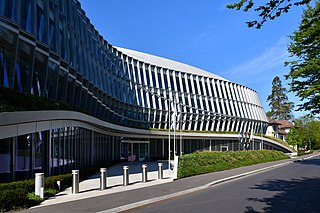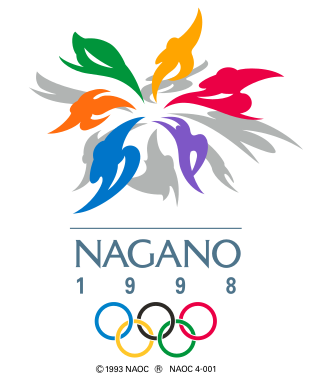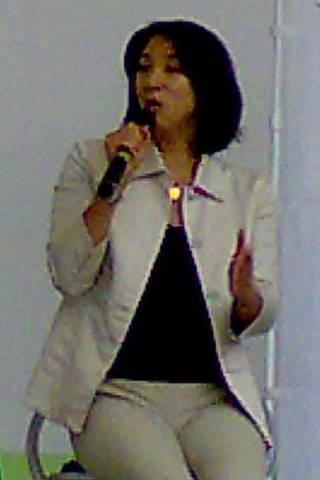Related Research Articles

The International Olympic Committee is a non-governmental sports organisation based in Lausanne, Switzerland.

The modern Olympic Games or Olympics are the leading international sporting events featuring summer and winter sports competitions in which thousands of athletes from around the world participate in a variety of competitions. The Olympic Games are considered the world's foremost sports competition with more than 200 teams, representing sovereign states and territories, participating. By default, the Games generally substitute for any world championships during the year in which they take place. The Olympic Games are held every four years. Since 1994, they have alternated between the Summer and Winter Olympics every two years during the four-year Olympiad.

The Winter Olympic Games is a major international multi-sport event held once every four years for sports practiced on snow and ice. The first Winter Olympic Games, the 1924 Winter Olympics, were held in Chamonix, France. The modern Olympic Games were inspired by the ancient Olympic Games, which were held in Olympia, Greece, from 776 BC to 394 AD. The Baron Pierre de Coubertin of France founded the International Olympic Committee (IOC) 1,500 years later in 1894, leading to the first modern Summer Olympic Games in Athens, Greece in 1896. The IOC is the governing body of the Olympic Movement, with the Olympic Charter defining its structure and authority. The original five Winter Olympic Sports were bobsleigh, curling, ice hockey, Nordic skiing, and skating. The Games were held every four years from 1924 to 1936, interrupted in 1940 and 1944 by World War II, and resumed in 1948. Until 1992, the Summer Olympic Games and the Winter Olympic Games were held in the same year. A decision to change this was made in 1986, when during the 91st International Olympic Committee session, IOC members decided to alternate the Summer Olympic Games and the Winter Olympic Games on separate four-year cycles in even-numbered years. Also, at that same congress it was decided that 1992 Winter Olympics would be the last to be held in the same year as the Summer Games and that to change the rotation, the games that would be held in 1996 would be brought forward by two years, being scheduled to 1994. After those games, the next were to be held in 1998 when the four-year Olympic Cycle resumed.

The 1964 Summer Olympics, officially the Games of the XVIII Olympiad and commonly known as Tokyo 1964, were an international multi-sport event held from 10 to 24 October 1964 in Tokyo, Japan. Tokyo had been awarded the organization of the 1940 Summer Olympics, but this honor was subsequently passed to Helsinki due to Japan's invasion of China, before ultimately being cancelled due to World War II. Tokyo was chosen as the host city during the 55th IOC Session in West Germany on 26 May 1959.

The 1998 Winter Olympics, officially known as the XVIII Olympic Winter Games and commonly known as Nagano 1998, were a winter multi-sport event held from 7 to 22 February 1998, mainly in Nagano, Nagano Prefecture, Japan, with some events taking place in the nearby mountain communities of Hakuba, Karuizawa, Nozawa Onsen, and Yamanouchi. The city of Nagano had previously been a candidate to host the 1940 Winter Olympics, as well as the 1972 Winter Olympics, but had been eliminated at the national level by Sapporo on both occasions.

The 1920 Summer Olympics, officially known as the Games of the VII Olympiad and commonly known as Antwerp 1920, were an international multi-sport event held in 1920 in Antwerp, Belgium.

The 1998 Winter Olympics, officially known as the XVIII Olympic Winter Games, was a winter multi-sport event held in Nagano, Japan, from 7 to 22 February 1998. Twenty-four nations earned medals at these Games, and fifteen won at least one gold medal; forty-eight countries left the Olympics without winning a medal. Competitors from Germany earned the highest number of gold medals (12) and the most overall medals (29). With 10 gold medals and 25 overall medals, Norway finished second in both categories. Denmark won its first – and as of 2018 only – Winter Olympics medal, while Bulgaria and the Czech Republic won their first Winter Games gold medals. Azerbaijan, Kenya, Macedonia, Uruguay, and Venezuela competed for the first time, but none of them won a medal.
The 2002 Olympic Winter Games bid scandal was a scandal involving allegations of bribery used to win the rights to host the 2002 Winter Olympics in Salt Lake City, Utah, United States. Prior to its successful bid in 1995, the city had attempted four times to secure the games, failing each time. In 1998, members of the International Olympic Committee (IOC) were accused of taking gifts from the Salt Lake Organizing Committee (SLOC) during the bidding process. The allegations resulted in the expulsion of several IOC members, and the adoption of new IOC rules. Although nothing strictly illegal had been done, it was felt that the acceptance of the gifts was morally dubious. Soon four independent investigations were underway: by the IOC, the United States Olympic Committee (USOC), the SLOC, and the United States Department of Justice. Both Tom Welch and David Johnson resigned their posts as the head of the SLOC. Many others soon followed. The Department of Justice filed fifteen charges of bribery and fraud. Investigations were also launched into prior bidding process by other cities, finding that members of the IOC received gifts during the bidding process for both the 1998 Winter Olympics and 2000 Summer Olympics.

The 2020 Summer Olympics, officially the Games of the XXXII Olympiad and officially branded as Tokyo 2020, were an international multi-sport event held from 23 July to 8 August 2021 in Tokyo, Japan, with some preliminary events that began on 21 July 2021. Tokyo was selected as the host city during the 125th IOC Session in Buenos Aires, Argentina on 7 September 2013.

National Olympic Committees that wish to host an Olympic Games select cities within their territories to put forth bids for the Olympic Games. The staging of the Paralympic Games is automatically included in the bid. Since the creation of the International Olympic Committee (IOC) in 1894, which successfully appropriated the name of the Ancient Greek Olympics to create a modern sporting event, interested cities have rivaled for selection as host of the Summer or Winter Olympic Games. 51 different cities have been chosen to host the modern Olympics: three in Eastern Europe, five in East Asia, one in South America, three in Oceania, nine in North America and all the others in Western Europe. No Central American, African, Central Asian, Middle Eastern, South Asian, or Southeast Asian city has ever been chosen to host an Olympics.

The Japanese Olympic Committee is the National Olympic Committee in Japan for the Olympic Games movement, based in Tokyo, Japan. It is a non-profit organisation that selects teams and raises funds to send Japanese competitors to Olympic events organised by the International Olympic Committee (IOC).

Brazil sent a delegation to compete at the 1998 Winter Olympics in Nagano, Japan from 7–22 February 1998. The delegation consisted of a single athlete Marcelo Apovian, who competed in alpine skiing. Making his second Olympic appearance, he finished his only event, the men's super-G in 37th place, last among those who finished the race.

The selection process for the 1998 Winter Olympics consisted of five bids, and saw Nagano, Japan, be selected ahead of Salt Lake City, Utah, United States; Östersund, Sweden; Jaca, Spain; and Aosta, Italy. The selection was made at the 97th IOC Session in Birmingham, United Kingdom, on 15 June 1991.

Mikako Kotani is a Japanese former synchronized swimmer who competed in the 1988 Summer Olympics, where she gained a bronze medal each for the solo and duet events, and the 1992 Summer Olympics. She was the first woman to be Japan's flag-bearer for the 1988 Summer Olympics Opening Ceremony.
The men's large hill team ski jumping competition for the 1998 Winter Olympics was held in Hakuba Ski Jumping Stadium. It occurred on 17 February.
The 2032 Summer Olympics, officially the Games of the XXXV Olympiad and also known as Brisbane 2032, is an upcoming international multi-sport event scheduled to take place from 23 July to 8 August 2032, in Brisbane, Queensland, Australia.
Tasuku Tsukada was a Japanese politician, and past mayor of the city of Nagano, the capital of Nagano Prefecture, in central Japan. Tsukada won his first mayoral contest in 1985. He served four full 4-year terms, until November 10, 2001. In 1997, Tsukada served as the Vice President of the Japan Association of City Mayors.
The closing ceremony of the 1998 Winter Olympics took place at Nagano Olympic Stadium, Nagano, Japan, on 22 February 1998. It began at 18:00 JST and finished at approximately 19:41 JST. As mandated by the Olympic Charter, the proceedings combines the formal and ceremonial closing of this international sporting event, including farewell speeches and closing of the Games by IOC President Juan Antonio Samaranch. The Olympic flame has been extinguished.
References
- ↑ Evans, Hilary; Gjerde, Arild; Heijmans, Jeroen; Mallon, Bill; et al. "Junichi Yamaguchi Olympic Results". Olympics at Sports-Reference.com. Sports Reference LLC. Archived from the original on 17 April 2020. Retrieved 26 September 2019.
- ↑ Jordan, Mary; Sullivan, Kevin (21 January 1999), "Nagano Burned Documents Tracing '98 Olympics Bid", Washington Post, pp. A1, archived from the original on 29 April 2021, retrieved 28 April 2021
- ↑ Macintyre, Donald (1 February 1999). "Japan's Sullied Bid". Time Magazine. Retrieved 20 August 2016.